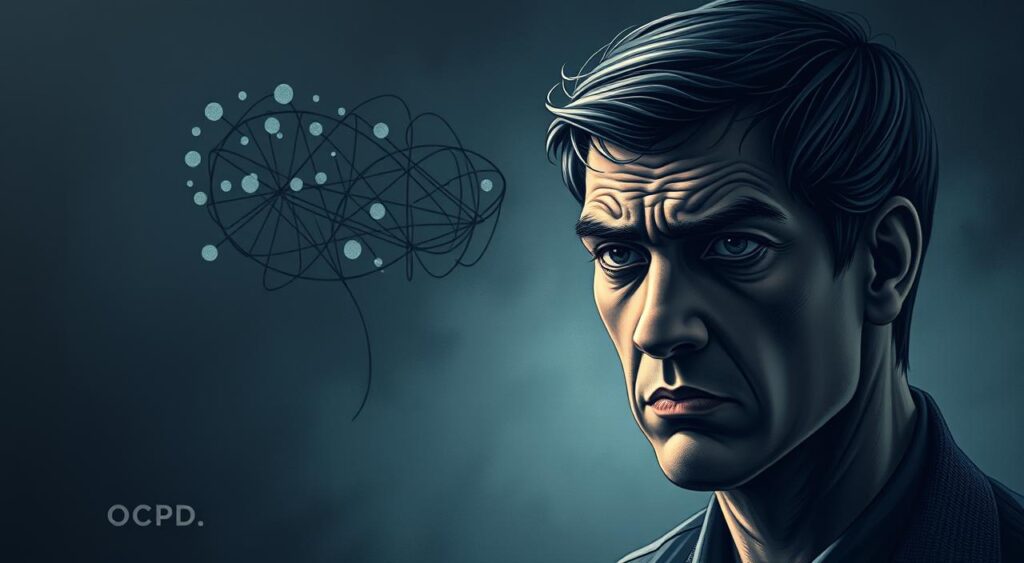Understand the key characteristics of Obsessive-Compulsive Personality Disorder and how it impacts daily life. Get expert insights on managing OCPD.
Obsessive-Compulsive Personality Disorder (OCPD) is a mental health issue. It’s all about being very particular about order, perfection, and control. Knowing about OCPD is key for those who might have it and for those who want to help.
This article will dive deep into OCPD. We’ll cover what it is, its traits, and how to treat it.

It’s important to know OCPD is different from other mental health issues like OCD. By understanding these differences, we can better help those with OCPD. This article will explore OCPD’s signs, causes, and how it affects daily life. We’ll give a full view of what OCPD is.
Key Takeaways
- Understanding obsessive-compulsive personality disorder is essential for recognizing its symptoms and seeking treatment.
- OCPD is distinct from obsessive-compulsive disorder (OCD) and requires a unique approach to treatment.
- Recognizing the signs and symptoms of OCPD is crucial for diagnosis and treatment of obsessive-compulsive personality disorder.
- OCPD can significantly impact personal relationships and daily life, making treatment and support essential.
- Seeking professional help is the first step towards managing and overcoming obsessive-compulsive personality disorder.
- Education and awareness about OCPD can help reduce stigma and promote understanding of obsessive-compulsive personality disorder.
Understanding Obsessive-Compulsive Personality Disorder
Obsessive-Compulsive Personality Disorder (OCPD) is a mental health issue. It makes people very focused on order, perfection, and control. They stick to rules and routines too much, which can hurt their daily life and relationships.
To get OCPD, knowing its main traits is key. This helps us understand it better.
Research shows who might get OCPD more often. It’s more common in some families. Knowing this helps us plan better treatments and improve results.
What Defines OCPD
OCPD is marked by a few key points. People with it love details, need to control things, and can’t let others help. They also want everything perfect and can’t change plans easily.
This shows up in many ways. For example, they might focus too much on small details or insist on doing things their way.
Key Characteristics
Some main traits of OCPD include:
- A need for control and orderliness
- Perfectionism and a high level of self-criticism
- An inability to delegate tasks or trust others
- A preoccupation with details and a tendency to get bogged down in minutiae
Prevalence and Demographics
Studies say about 1-2% of people have OCPD. It’s more common in men than women and can happen at any age. Knowing who gets OCPD helps us make better treatments and improve results.
The Distinction Between OCPD and OCD
It’s important to know the difference between obsessive-compulsive personality disorder (OCPD) and obsessive-compulsive disorder (OCD). Both involve obsessive and compulsive behaviors. But they have different criteria for diagnosis and treatment.
OCPD is about being very focused on order, perfection, and control. OCD, on the other hand, is about having thoughts that are upsetting and actions that are compulsive. These actions interfere with daily life. Here are some main differences:
- OCPD: preoccupation with orderliness, perfectionism, and control
- OCD: presence of obsessions and compulsions that are distressing and impair daily functioning
Knowing these differences helps in treating obsessive-compulsive disorder properly. Healthcare professionals can then create treatment plans that meet each patient’s needs.
Common Signs and Symptoms
People with Obsessive-Compulsive Personality Disorder (OCPD) show many signs and symptoms. These can affect their daily life. They can see these in how they act, feel, and function.
Behavioral Patterns
Those with OCPD stick to rules and want everything perfect. They also like to control things and can’t share tasks. These habits show up in their daily life, work, and relationships.
Emotional Manifestations
Emotionally, OCPD folks feel a lot of stress and worry. They get upset if things don’t go as planned or if they feel out of control. This can make them feel angry, sad, and frustrated.
Impact on Daily Functions
OCPD symptoms can really mess with daily life. They can hurt personal and work relationships and overall happiness. Some common signs include:
- Being too focused on details and organization
- Wanting everything perfect and following rules strictly
- Needing to control everything and not being able to share tasks
- Feeling a lot of stress and worry when things don’t go as planned
It’s key to spot these signs to help those with OCPD. This can ease their anxiety and improve their life quality.
Root Causes and Risk Factors
Research shows that Obsessive-Compulsive Personality Disorder (OCPD) might come from genetics, environment, and psychology. Knowing these causes helps in finding ways to prevent and treat it.
Some possible causes of OCPD are:
- Genetic factors, like a family history of OCPD or other personality disorders
- Environmental factors, such as trauma or big stress
- Psychological factors, like wrong thinking patterns or bad ways to deal with problems

By looking into these causes and risk factors, people can understand OCPD better. They can also take steps to lessen its effects.
| Factor | Description |
|---|---|
| Genetic | Family history of OCPD or other personality disorders |
| Environmental | Trauma or significant stress |
| Psychological | Cognitive distortions or maladaptive coping mechanisms |
Diagnosis and Assessment Methods
Diagnosing Obsessive-Compulsive Personality Disorder (OCPD) is a detailed process. It includes a deep look into a person’s past, observing their behavior, and checking their mental and emotional state. The aim is to spot a pattern of needing everything to be perfect and in control.
The DSM-5 sets out clear guidelines for diagnosing OCPD. It looks for a focus on details, a need for control, and wanting others to follow their rules. Knowing the treatment options depends on understanding why someone has OCPD and how it affects their life.
Clinical Evaluation Process
Diagnosing OCPD involves talking to the person, observing them, and using special tools. These tools help tell OCPD apart from other conditions. With the right tools and knowledge, doctors can find the best treatment options for each person.
Diagnostic Criteria
The DSM-5 gives doctors a clear guide for diagnosing OCPD. It helps them find the right treatment options for those with the disorder. The criteria include:
- A focus on details, rules, and being organized
- A need for control and perfection
- Wanting others to do things their way
By knowing these criteria and using the right tools, doctors can offer the best treatment options and support for OCPD patients.
Impact on Personal Relationships
People with Obsessive-Compulsive Personality Disorder (OCPD) often find it hard to connect with others. Their perfectionism makes them expect too much from others, putting a strain on relationships. Their strict focus on details and unwillingness to bend can make it tough to keep relationships strong and meaningful.
Some common problems in relationships with those who have OCPD include:
- Difficulty with emotional intimacy
- Excessive criticism and nitpicking
- Resistance to change and flexibility
- High expectations for others
It’s important to understand how OCPD affects personal relationships. This knowledge helps in finding ways to improve communication and empathy. By tackling the issues of perfectionism and other OCPD traits, people can build stronger, more supportive connections.

Research shows that therapy and support groups can help those with OCPD. These resources aid in developing better coping strategies and improving relationships. By tackling the core issues of OCPD, individuals can strive for more harmonious and fulfilling personal connections.
| Common Issues in OCPD Relationships | Strategies for Improvement |
|---|---|
| Difficulty with emotional intimacy | Practice active listening and empathy |
| Excessive criticism and nitpicking | Focus on positive feedback and constructive criticism |
| Resistance to change and flexibility | Encourage open communication and compromise |
Treatment Approaches and Options
People with Obsessive-Compulsive Personality Disorder (OCPD) have many treatment options. The main goal is to manage symptoms and enhance life quality. Studies show that combining psychotherapy and medication can help reduce OCPD symptoms.
Psychotherapy Methods
Cognitive-behavioral therapy (CBT) is often suggested for OCPD treatment. It helps change negative thoughts and behaviors linked to the disorder. Psychodynamic therapy can also help by addressing deep issues and improving emotional control.
Medication Options
Medicines like SSRIs might be given to manage anxiety and depression that often go with OCPD. It’s crucial to work with a healthcare expert to find the right treatment.
Alternative Therapies
Alternative therapies, like mindfulness-based interventions, can also help. They reduce stress and improve emotional balance. These can be used alongside traditional treatments for a full approach to OCPD management. Some options include:
- Mindfulness-based stress reduction
- Cognitive-behavioral therapy
- Psychodynamic therapy
Exploring different treatments can help individuals with OCPD find what works best for them. With the right treatment, they can manage their symptoms and enhance their well-being.
Living with OCPD: Coping Strategies
Managing Obsessive-Compulsive Personality Disorder (OCPD) needs different coping strategies. These help lessen its symptoms and understand its causes. By using effective self-management and making lifestyle changes, people with OCPD can feel less stressed and better overall.
Self-Management Techniques
Some helpful self-management techniques for OCPD include:
- Keeping a journal to track thoughts and behaviors
- Practicing relaxation techniques, such as deep breathing or meditation
- Engaging in regular exercise to reduce stress and improve mood
Lifestyle Modifications
To find a better balance in life and lessen OCPD’s daily impact, try these lifestyle changes:
- Establishing a regular daily routine
- Setting realistic goals and priorities
- Learning to delegate tasks and ask for help when needed
By using these coping strategies and making lifestyle changes, people with OCPD can manage their symptoms and causes better. This leads to better mental health and well-being.
| Self-Management Techniques | Lifestyle Modifications |
|---|---|
| Journaling | Regular daily routine |
| Relaxation techniques | Realistic goal-setting |
| Regular exercise | Delegating tasks |
Supporting Someone with OCPD
Supporting someone with Obsessive-Compulsive Personality Disorder (OCPD) means understanding the disorder well. It’s key to be empathetic and patient. Their behaviors and attitudes are part of the disorder.
Experts say supporting someone with OCPD means encouraging open talks. It’s also about helping them find professional help. This could be therapy or medication to ease anxiety and other issues.
Here are some ways to support someone with OCPD:
- Encourage them to share their feelings and worries.
- Help them find ways to cope with stress.
- Be there for them in their therapy and treatment.
OCPD can really affect personal relationships. Being patient, understanding, and supportive can help. This way, you can help them build stronger, more meaningful connections with others.
Creating a supportive and non-judgmental space is crucial. It helps them feel safe to share their struggles and work towards recovery. Supporting someone with a mental health disorder is a long-term commitment. It requires a willingness to learn and adapt.
Conclusion: Moving Forward with OCPD
Obsessive-Compulsive Personality Disorder (OCPD) is a complex mental health issue. It deeply affects people’s lives. Knowing what it is, its traits, and how it differs from OCD is key for support.
Spotting signs like perfectionism and rigidity is important. It helps those with OCPD find the right treatment and support.
Looking back at what we’ve covered shows how vital diagnosis, treatment, and coping strategies are. Acknowledging the hurdles of ocd personality disorder and the need for professional help is crucial. Obsessive-compulsive personality disorder needs a mix of psychotherapy, medication, and lifestyle changes to manage its symptoms well.
Supporting those with OCPD means being empathetic, understanding, and patient. By raising awareness and education about obsessive-compulsive personality disorder, we can create a better environment. This encourages those affected to seek help and live a better life.
FAQ
Q: What is Obsessive-Compulsive Personality Disorder (OCPD)?
A: OCPD is a mental health disorder. It involves a strong focus on order, perfection, and control. It’s different from OCD and is important to understand for those experiencing symptoms and their supporters.
Q: What are the key characteristics of OCPD?
A: OCPD is marked by strict rule-following and perfectionism. People with OCPD often struggle with delegating tasks. They also have a hard time being flexible and focus too much on details.
Q: How does OCPD differ from OCD?
A: OCPD and OCD both involve obsessive and compulsive behaviors. But they have different symptoms and treatments. OCPD focuses on order, perfection, and control. OCD is about distressing obsessions and compulsions that interfere with daily life.
Q: What are the common signs and symptoms of OCPD?
A: Signs of OCPD include strict rule-following and perfectionism. People with OCPD need control and struggle with delegating tasks. They feel a lot of distress and anxiety when things don’t go as planned.
Q: What are the potential causes and risk factors of OCPD?
A: The exact causes of OCPD are not known. But it’s thought to involve genetics, environment, and psychology. People with a family history of OCPD or other disorders might be at higher risk.
Q: How is OCPD diagnosed and assessed?
A: Diagnosing OCPD requires a detailed evaluation. This includes a psychiatric history, observing behavior, and assessing cognitive and emotional functions. The DSM-5 outlines specific criteria for diagnosing OCPD.
Q: What are the treatment options for OCPD?
A: Treatment for OCPD often includes psychotherapy, especially cognitive-behavioral therapy (CBT). CBT helps change negative thought patterns and behaviors. Medications like SSRIs might also be used to manage anxiety and depression.
Q: How can individuals with OCPD manage their symptoms and improve their daily functioning?
A: People with OCPD can manage symptoms by using self-management techniques. Keeping a journal, practicing relaxation, and exercising regularly can help. Lifestyle changes like a regular routine, setting realistic goals, and delegating tasks can also improve daily life.
Q: How can family and friends support individuals with OCPD?
A: Supporting someone with OCPD means understanding the disorder and its effects. Be patient and empathetic. Encourage open communication and help them seek professional help. Supporting their treatment and coping strategies can greatly improve their well-being and relationships.
